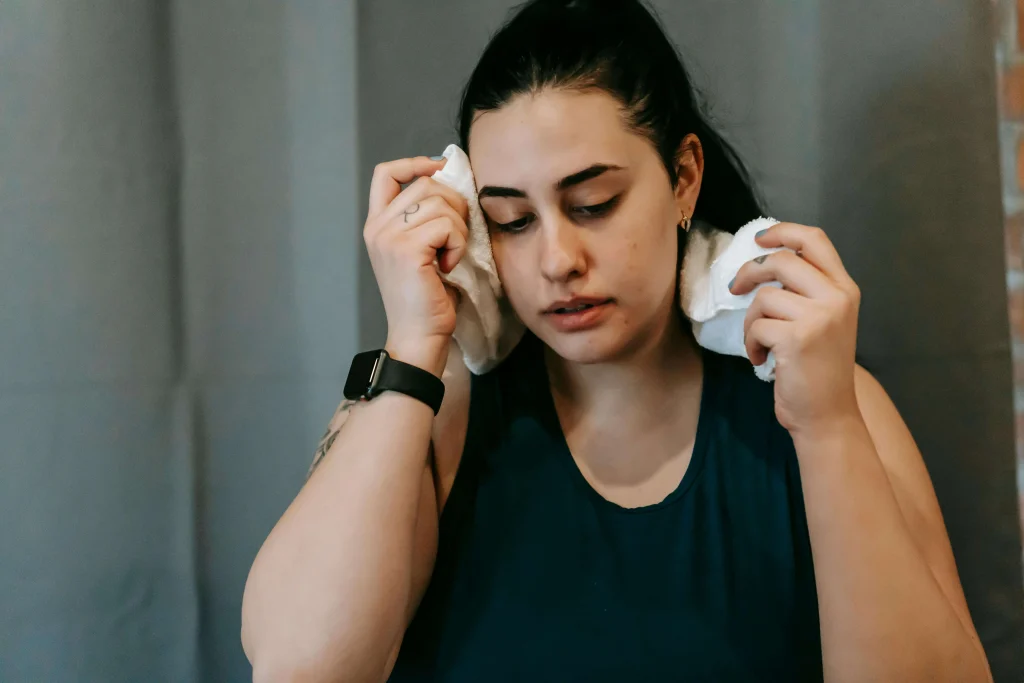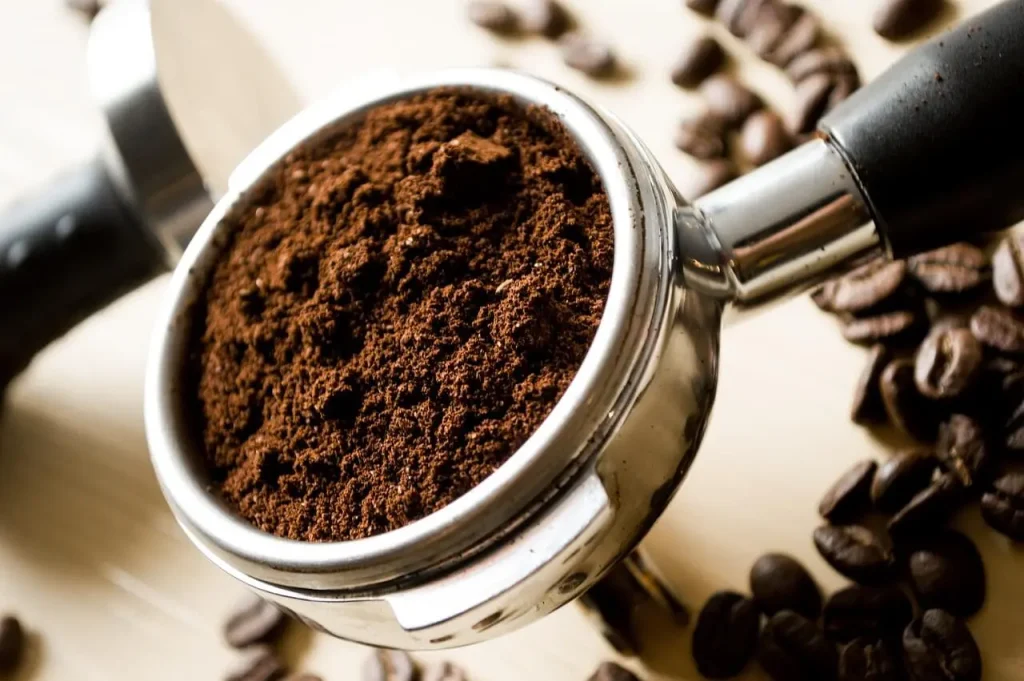
You took your favourite pre-workout an hour ago and are now feeling sweaty, wondering what the problem could be. The key question in your mind right now is “Does pre-workout make you sweat more?”
Pre-workout supplements contain a variety of ingredients that increase sweating. For example, caffeine is a common ingredient in pre-workout supplements, and it is known to increase sweating.
Additionally, ingredients like beta-alanine, niacin, capsicum, and green tea extract found in pre-workout supplements can cause sweating as they raise body temperature. Continue reading to discover further information on why pre-workout makes you sweat.
Does Pre-Workout Make You Sweat More?

Does Pre-Workout Make You Sweat More? In essence, while pre-workout supplements don’t inherently cause increased sweating, it’s the specific components they contain—such as caffeine, beta-alanine, thermogenic elements, and nitric oxide enhancers—that elevate your heart rate, body temperature, and metabolic activity during workouts. These physiological changes naturally lead to heightened sweat production as your body attempts to cool down and regulate its temperature.
The Mechanism of Pre-Workout-Induced Sweating
The mechanism of pre-workout-induced sweating revolves around the body’s natural response to exercise and the intensified effects caused by pre-workout supplements.
When you engage in physical activity, your body’s demand for oxygen increases, raising the heart rate and metabolic rate.
This metabolic acceleration is necessary for producing the energy required for sustained exercise. As your muscles work harder, they generate more heat, which raises your core body temperature.
Pre-workout supplements enhance exercise performance, by improving endurance, strength, and focus. They do so by stimulating your body’s energy production processes. This stimulation further increases your metabolic rate beyond what exercise alone would cause.
As your core body temperature rises, your body activates its cooling mechanisms to prevent overheating.
Sweating is one of the primary methods your body uses to cool itself. The sweat glands produce sweat, which then evaporates from the skin’s surface, carrying away heat and helping to regulate your body temperature.
In essence, the mechanism behind pre-workout-induced sweating is a combination of increased metabolic activity and body temperature resulting from both the physical exertion of exercise and the metabolic stimulation from pre-workout supplements.
This process emphasizes the body’s effort to maintain a stable internal environment (homeostasis) during the heightened physical demands of exercise, leading to increased sweat production as a natural cooling response.
What Key Ingredients in Pre-Workouts Cause Excessive Sweating?

As discussed earlier pre-workouts contain certain ingredients that raise your body’s core temperature, causing excessive sweating. Here are some of the common ingredients:
Caffeine
Caffeine is a common ingredient in pre-workout supplements known for its stimulant properties. It can increase your heart rate, blood pressure, and body temperature, which can cause you to sweat more during your workout.
Caffeine is also thermogenic, which means that it can increase your body’s metabolic rate, leading to an increase in sweating.
Green Tea Extract
Green tea extract is another common ingredient in pre-workout supplements. It contains catechins, which are known for their thermogenic properties.
Like caffeine, green tea extract can increase your body’s metabolic rate, leading to excessive sweating.
Pepper Extract (Capsaicinoids)
Pepper extract, specifically capsaicinoids, is known for its thermogenic properties.
It can increase your body’s core temperature, leading to an increase in sweating. Capsaicinoids can also boost your metabolism, which can lead to an increase in sweating.
CLA (Conjugated Linoleic Acid)
CLA is a fatty acid that is often used in weight loss supplements. It can increase your body’s metabolic rate, leading to an increase in sweating.
CLA can also help to reduce body fat, which can lead to a decrease in body weight and an increase in sweating during exercise.
Garcinia Cambogia
Garcinia Cambogia is a fruit that is often used in weight loss supplements. It contains hydroxycitric acid (HCA), which can increase your body’s metabolic rate, causing excessive sweating.
HCA can also help to reduce body fat, which can lead to an increase in sweating during exercise.
Capsicum (from Chilies)
Capsicum, derived from chillies, is known for its thermogenic properties. It can increase your body’s core temperature, leading to an increase in sweating.
Capsicum can also boost your metabolism, which can lead to an increase in sweating.
Yohimbe Bark Extract
Yohimbe bark extract is known for its stimulant properties. It can increase your heart rate, blood pressure, and body temperature, which can cause you to sweat more during your workout.
Yohimbe bark extract can also boost your metabolism, leading to an increase in sweating.
L-Carnitine
L-carnitine is an amino acid that is often used in weight loss supplements. It can increase your body’s metabolic rate, leading to an increase in sweating.
L-carnitine can also help to reduce body fat, which can lead to an increase in sweating during exercise.
Nitric Oxide Boosters and Workout Intensity
Nitric oxide is a naturally occurring molecule in the body that helps to dilate blood vessels and increase blood flow.
Nitric oxide boosters are supplements that claim to increase the production of nitric oxide in the body, leading to better blood flow and increased workout performance.
While nitric oxide boosters may help increase blood flow, there is limited research on whether they make you sweat more.
One study found that nitric oxide supplementation did not significantly influence nitric oxide synthase-dependent sweating during exercise in the heat.
However, another study found that dietary nitrate supplementation increased local sweating during exercise in a hot environment.
Note, that increasing your body temperature during a workout is a natural response to exercise. Sweating is the body’s way of regulating body temperature and cooling you down.
While nitric oxide boosters may increase blood flow and improve workout performance, they may not necessarily make you sweat more.
Does Creatine Make You Sweat More?
If you’re wondering what the thermogenic effect of creatine is and whether it is the main cause of your excessive sweating from pre-workout intake, stick around.
Creatine is a popular supplement that is often used to improve exercise performance. It is known for its ability to increase muscle mass, strength, and power.
Creatine supplementation can also have thermogenic effects, which can increase body temperature and cause sweating. This effect is more pronounced during exercise, especially in hot and humid conditions.
It’s important to note that the thermogenic effects of creatine are relatively mild and may not be noticeable to everyone.
In addition, not all pre-workout supplements contain creatine, so the effect on sweating will depend on the specific supplement you are taking.
How to Deal With Excessive Sweating From Pre-Workouts
Experiencing excessive sweating during or after a workout can be uncomfortable and embarrassing. If you find that pre-workout supplements are causing you to sweat excessively, consider the following strategies to manage it effectively:
Hydrate Adequately
- Proper hydration is essential. Dehydration can exacerbate sweating.
- Drink water before, during, and after your workout to maintain optimal fluid balance.
Choose the Right Pre-Workout
- Some pre-workout supplements contain ingredients that increase body temperature and sweating (such as thermogenic compounds).
- Consider switching to a different pre-workout formula with fewer thermogenic ingredients if excessive sweating is an issue.
Monitor Caffeine Intake
- Caffeine is a common ingredient in pre-workouts. While it enhances alertness and performance, it can also increase sweating.
- Be mindful of caffeine consumption from other sources (coffee, tea, energy drinks) to avoid overstimulation.
Wear Breathable Clothing
- Opt for moisture-wicking fabrics that allow sweat to evaporate.
- Avoid heavy cotton materials that trap moisture against your skin.
Cool Down Gradually
- After an intense workout, allow your body to cool down gradually.
- Sudden temperature changes can trigger excessive sweating.
Use Antiperspirants
- Apply antiperspirant to areas prone to sweating (such as underarms and forehead) before your workout.
- Look for antiperspirants containing aluminium chloride for better sweat control.
Shower Immediately After Exercise
- Rinse off sweat promptly to prevent bacterial growth and odour.
- Use an antibacterial soap if needed.
Consult a Healthcare Professional
- If excessive sweating persists despite lifestyle modifications, consult a doctor.
- They can rule out any underlying medical conditions (such as hyperhidrosis) and provide personalized advice.
If you experience side effects like jitters, nausea, and anxiety after taking excessive doses of pre-workout, you can eliminate it from your system.
Conclusion
In a nutshell, Does pre-workout make you sweat more? Yes, Pre-workout supplements can make you sweat more than usual while exercising. Although they don’t directly cause increased sweating, their components, such as caffeine, beta-alanine, and thermogenic elements, can elevate your heart rate, body temperature, and metabolic activity during workouts. This leads to heightened sweat production as your body tries to cool down. So, if you take a pre-workout supplement before exercising, it’s normal to sweat more than usual.
Remember, excessive sweat can be a sign of dehydration, and lead to negative health consequences. Therefore, it is essential to stay hydrated during exercise by drinking plenty of water.
Why do I sweat more with pre-workout?
The reason you sweat more with pre-workout is because of its thermogenic ingredients like caffeine and pepper extracts. These ingredients increase your metabolism, heart rate, and body temperature, causing increased sweat production to cool the body down.
Why am I so hot after taking pre-workout?
You feel hotter after taking a pre-workout because its ingredients, especially stimulants and thermogenic compounds, raise your body temperature. This increase is a direct result of enhanced metabolism and energy production processes activated by the supplement.
Does pre-workout make you burn more?
Yes, pre-workout can make you burn more calories. The ingredients designed to boost your energy and workout intensity, such as caffeine and nitric oxide boosters, also increase your metabolic rate, leading to higher calorie burn during exercise.
Does pre-workout give you night sweats?
Pre-workout can give you night sweats if consumed too close to bedtime. The stimulants in pre-workout, particularly caffeine, can affect your sleep cycle and body temperature, potentially causing night sweats.
Are pre-workouts healthy?
Pre-workouts can be healthy if used correctly and in moderation. They are designed to enhance workout performance and energy levels. However, it’s important to be mindful of their caffeine content and other stimulants, which can have side effects if overused.
Is it OK to drink pre-workout at night?
It’s generally not recommended to drink pre-workout at night, especially if it contains high levels of stimulants like caffeine. These can interfere with your ability to fall asleep and affect sleep quality. If evening workouts are your routine, consider a low-stimulant or stimulant-free pre-workout option.
Does beta-alanine make you sweat?
Beta-alanine does not directly make you sweat. It enhances workout intensity by delaying muscle fatigue, which may indirectly lead to increased sweating due to more vigorous exercise.